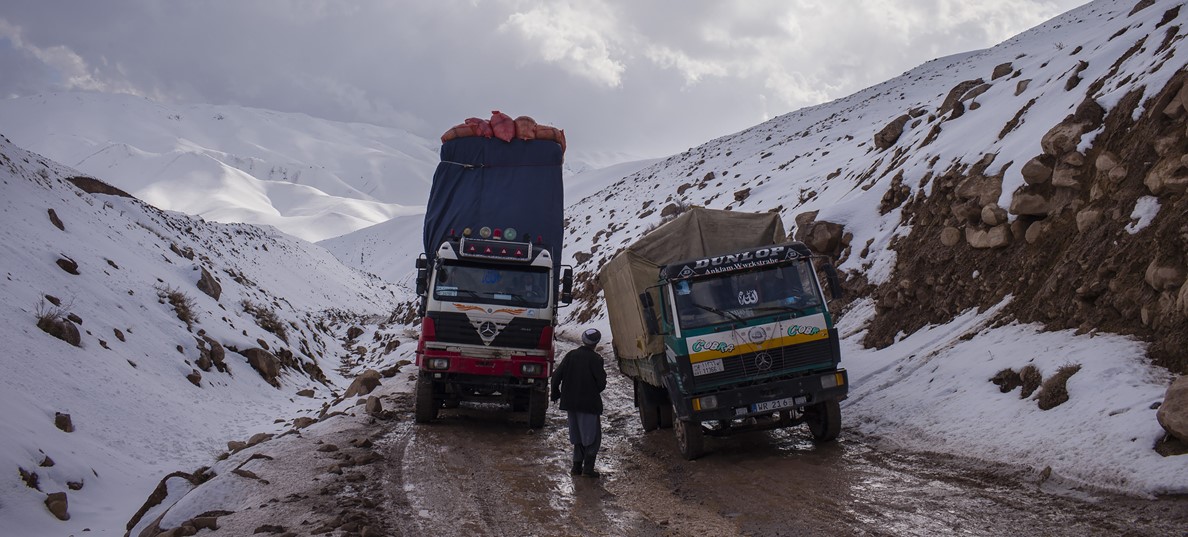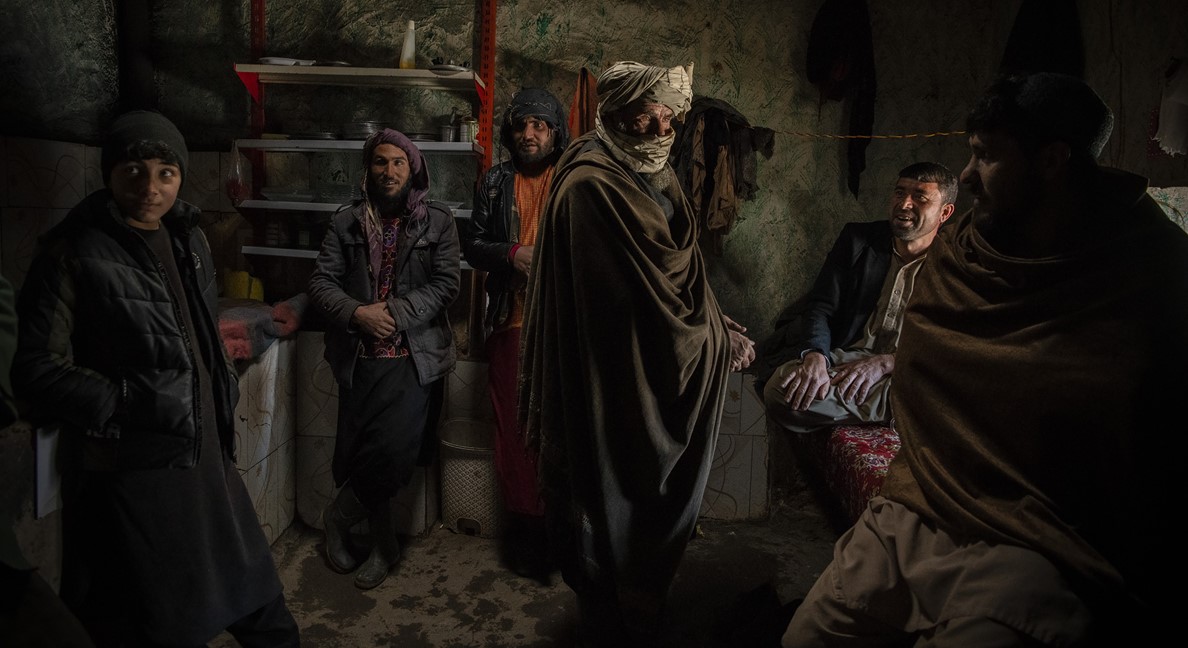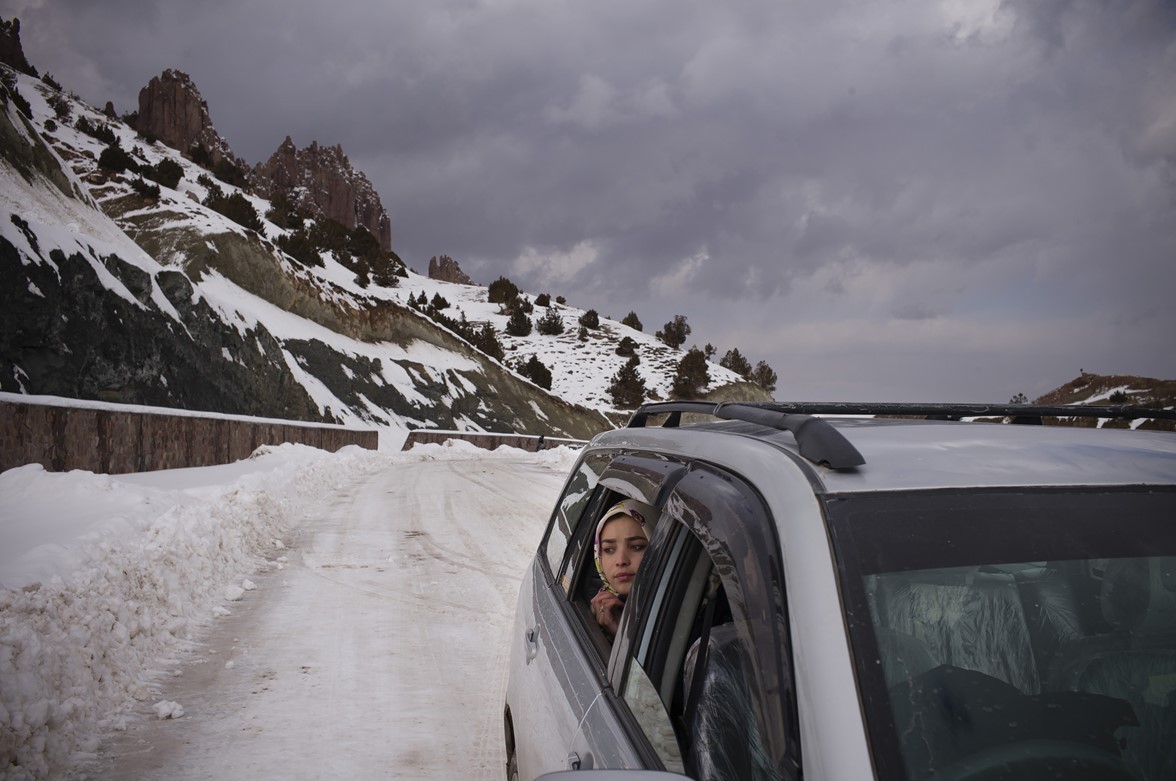SABZAK PASS, Afghanistan — The hotel is perched on the side
of a mountain blanketed in snow. The ice-slicked road outside is treacherous.
It stretches for kilometers in either direction through jagged peaks as it
winds around the edges of cliffs and dips past piles of boulders left over from
frequent rockslides.
اضافة اعلان
It is 6:30am, and inside the hotel’s kitchen, Najibullah
Bastani throws kindling onto a small fire and places a dented metal teapot
above its flames.
“What will this day bring?” Bastani sighed as he watched
flurries of snow graze the road outside and waited for the day’s first cars to
traverse the pass.
Ever since record-breaking winter weather seized Afghanistan
this year, Bastani has assumed an outsize role in this desolate stretch of
highway in Badghis province, the only land bridge open year-round that connects
cities across northern Afghanistan to the west.
“It’s my duty if I know them or even if I don’t know them. … I have to help them.”
As the temperatures plunged, thousands of parents with sick
children flooded the pass to reach the region’s only well-equipped hospital, in
Herat. Young men took to the road to begin their migrant journey into Iran in
search of work as their families struggled to buy food and wood to warm their
homes.
But the trek across the 32km stretch of the Sabzak Pass —
which is covered in snow six months of the year — is often as dangerous as the
troubles being fled. Cars slide from the road in flash storms. Rusted snow
chains, held together by twine, snap off tires. Piercing wind topples over trucks,
blocking the pass for days.
 The road leading to
Sabzak Pass, Afghanistan, February 8, 2023.
The road leading to
Sabzak Pass, Afghanistan, February 8, 2023.
For these and many other distressed travelers, Bastani’s
hotel has become a lighthouse of sorts.
Every trucker and taxi driver who frequents the pass knows
to call him when they find a vehicle that has run out of fuel or slipped off
the road. He delivers food to the passengers, calls the closest mechanic, and
sends a local taxi driver to bring them to the comfort of the hotel.
His efforts illustrate that in times of crisis — civil war
or foreign invasion or government collapse or an economic crisis like that
gripping Afghans today — the kindness of strangers often holds the country
together, an informal social backstop.
“It’s my duty if I know them or even if I don’t know them,”
said Bastani, 52. “I have to help them.”
The small guesthouse, known as the Sayed Abad Hotel, sits on
a small gravel strip at the center of the pass. Behind it is a small village,
whose mud-brick dwellings are home to about 80 families. Next to the hotel are
a few shops selling dust-coated cans of energy drinks, an outhouse with a
rickety wooden door, and a shed of kindling that village children collect each
morning.
 Villagers in the
kitchen of Najibullah Bastani’s Sayed Abad Hotel, a lifeline for travelers
braving the Sabzak Pass in Afghanistan, February 10, 2023.
Villagers in the
kitchen of Najibullah Bastani’s Sayed Abad Hotel, a lifeline for travelers
braving the Sabzak Pass in Afghanistan, February 10, 2023.
“Najibullah!” Ghulam Nabi, a shopkeeper, bellowed as he
walked into the hotel’s kitchen, the smell of sautéed onions filling the room.
“Did you put chains on your shoes when you walked here from your house this
morning?” Nabi asked.
Bastani let out a wry laugh and handed him a glass of tea.
Soon some other men lumbered down from the village into the warmth of the
kitchen and rested on a bench across from the fire.
“We can’t stay home. Our children will destroy us; they make
so much noise all the time,” said one of the men, Jalil Ahmad.
As the temperatures plummeted earlier in the year,
congregating in the kitchen each morning had become their daily routine —
looking for warmth as much as company.
The camaraderie was a welcome change for Bastani. When he
arrived in the area a year ago and asked to lease the hotel, the men in the village
were skeptical of the stranger. But Nabi, the hotel’s original owner, was also
eager for help running the business.
For much of the past 20 years, the pass had been maintained
by about 1,200 Afghan soldiers, tasked by the Western-backed government with
protecting the vital route from the Taliban.
The soldiers oversaw the highway’s transformation from a
dirt path to a paved road and assisted those who ran into trouble trying to
traverse its unforgiving terrain. But when the Western-backed government collapsed,
so too did the safety net those soldiers provided. Practically overnight, the
hotel became the round-the-clock headquarters for roadside assistance.
“The government was solving people’s issues in the past,”
Nabi said, adding that the Taliban administration has stationed far fewer of
their soldiers along the pass.
After he took over running the hotel from Nabi, Bastani
assumed the role of the so-called Keeper of the Pass, a guardian for everyone
who dares cross it. Bastani said he relished the role, so different from what
his life had been.
He spent his late teenage years fighting for an Afghan
warlord who encouraged his troops to kill and steal at will, then deserted his
comrades in search of work in Iran, where he became addicted to drugs. His new life,
helping others along the road each day, seemed to offer him a sort of
redemption.
His eagerness to serve has injected new energy into the
surrounding village that — much like the pass — had languished since the
Western-backed government fell and the economy tanked with it.
The 700 trucks that once had traveled the road each day
shrank to around 300, squeezing the shopkeepers’ business. Shepherds lost their
herds to drought and then freezing weather. Village elders suddenly struggled
to collect enough leftovers to feed the community’s poorest.
 Travelers on the road
leading to Sabzak Pass, Afghanistan, February 8, 2023.
Travelers on the road
leading to Sabzak Pass, Afghanistan, February 8, 2023.
“It didn’t used to be like this,” said one shopkeeper, Abdul
Khaliq, 40. “It used to be when you went to relatives for help, they gave you
money, gave you food. But if you go to a relative now and ask for help, they
will say, ‘If I give you something now, then tomorrow, what will I eat?’”
The struggle to provide for one another has been felt across
the country, shaking the fabric of Afghan society as profoundly as the changes
the new government has wrought.
But for the thousands of travelers braving the unforgiving
pass each week, there is Bastani, his warm kitchen, his cellphone always at the
ready, and the men around him offering to lend a hand.
When the sound of ice crunching beneath tires alerted the
men to the day’s first customers, the kitchen sprung into action. As four men
walked into the hotel, Bastani put on a fresh pot of tea and instructed his
8-year-old son to offer the travelers bread.
“How many are you there? Want tea?” Bastani called through a
window into the main room.
When the driver asked about the conditions of the road,
Bastani recounted the story of a fatal accident only days earlier, after a bus
without chains on its tires had slid off the road into a small ditch.
For the thousands of travelers braving the unforgiving pass each week, there is Bastani, his warm kitchen, his cellphone always at the ready, and the men around him offering to lend a hand.
All of its passengers disembarked except for an older woman
and young boy who stayed on board, not wanting to wait in knee-deep snow. But
before Bastani and his men could move the bus back onto the road, it suddenly
slid farther and tumbled off a cliff — killing both the woman and the boy.
“You need to put on chains,” one of the shopkeepers advised
the driver sternly.
“And if you don’t put chains on,” Bastani added, “God only
knows.”
Before the driver departed into the white landscape, he
shook Bastani’s hand. He hoped not to see these men again, he confided, but was
comforted knowing that if he needed them, they would be there.
Read more Lifestyle
Jordan News







